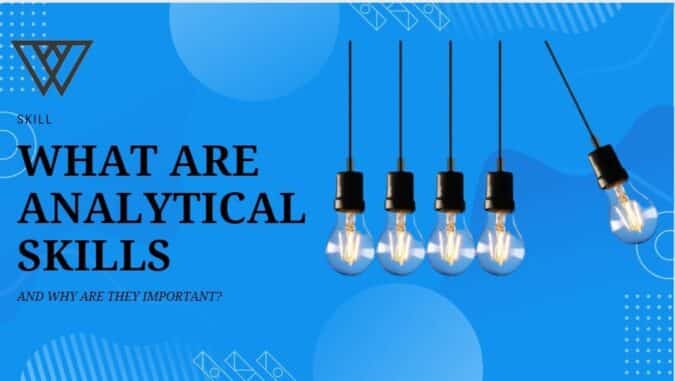Analytical skills involve processing complex information, identifying patterns, and drawing conclusions. They are becoming increasingly important in today’s data-driven world. These skills enable individuals to analyze data, identify patterns, and draw conclusions based on the available information. In this article, we will discuss the definition and importance of analytical skills in detail.
Importance of analytical skills
Analytical skills prove of great importance in personal and professional life, they increase and enhance a person’s thinking and progress in the workspace and beyond.
- Analytical skills are integral for effective decision-making, problem-solving, increased efficiency, effective communication, and future forecasting.
- These skills are highly valued by companies, and the demand for employees who can analyze data and draw meaningful conclusions has never been higher.
- Examining evidence and facts logically keeps you one step ahead, giving you an advantage in problem-solving.
How to Analyze and Solve Problems: A 4-Step Guide
Analytical thinking is a valuable skill that helps you tackle complex problems and come up with effective solutions. Here’s a step-by-step guide to help you develop your analytical thinking skills:
Step 1: Identify the Problem
The first step is to recognize that there is a problem that needs to be addressed. Observe and gather relevant information to precisely define what you are dealing with.
Step 2: Gather Information
After identifying the problem, collect all the necessary data and insights related to the issue. This information forms the basis of your analysis and problem-solving strategy.
Step 3: Analyze the Problem
Dive deep into the heart of the problem. Dissect the information gathered and begin to look for patterns, relationships, and the underlying causes of the issue.
Step 4: Solve the Problem
Craft the solution, armed with a thorough analysis. Generate options and strategically choose the most effective course of action.
Careers in analytical skills
Analytical skills are crucial in many careers, particularly in those that rely heavily on analytical thinking. Some of them are:
- Data Analyst/Data Scientist: These professionals use statistical methods and tools to analyze large datasets and draw insights from them.
- Financial Analyst: Financial analysts use analytical skills to assess financial data and advise companies or individuals on investment decisions.
- Management Consultant: Consultants use analytical skills to help organizations solve complex business problems and improve their operations.
- Market Research Analyst: Market research analysts use data and analytical tools to help companies understand consumer preferences, market trends, and other market dynamics.
- Engineer: Engineers use analytical skills to design, test, and improve products and systems, using mathematical and scientific principles.
- Medical Researcher: Medical researchers use analytical skills to analyze medical data and test hypotheses about diseases, treatments, and other medical topics.
- Economist: Economists use analytical skills to study economic data and make forecasts and recommendations about economic policy and trends.
- Policy Analyst: Policy analysts use analytical skills to evaluate policy proposals and make recommendations to policymakers.
- Actuary: Actuaries use analytical skills to evaluate financial risk and develop strategies to manage it.
- Operations Research Analyst: Operations research analysts use mathematical and analytical methods to help organizations optimize their operations and decision-making processes.
Analytical skills and critical thinking
Analytical thinking involves breaking a problem down into smaller parts and examining each step systematically before concluding. It goes beyond critical thinking, which involves examining evidence before making a judgment.
Example Of Analytical Thinking
A daily life example of a product’s sale ended up being lower than expected to demonstrate how you take an analytic approach towards your problems by putting more time into thinking and less into worrying.
- Define the problem: Sales for the new product are lower than expected.
- Gather information: Collect data on the product, such as sales figures, customer feedback, and competitor analysis.
- Break it down: Divide the problem into smaller parts, such as product design, marketing strategy, pricing, and distribution.
- Identify assumptions: Recognize any assumptions or beliefs you may have about the product, such as its target audience or market demand.
- Evaluate evidence: Analyze the data and evidence you have collected to determine what might be causing lower sales. Look for patterns and relationships between different factors, such as customer feedback on product design or pricing compared to competitors.
- Develop solutions: Based on your analysis, develop potential solutions, such as changing the product design, adjusting the marketing strategy, or reevaluating the pricing strategy.
Conclusion
In Conclusion, Analytical skills are crucial for processing and interpreting complex information. They enhance critical thinking and problem-solving capabilities. Analytical thinking allows individuals to break down problems, examine evidence, prioritize logical reasoning, and reach conclusions systematically.
FAQ’S
Analytical skills enable individuals to process, comprehend, and interpret complex information. These skills empower individuals to analyze data, identify patterns, and draw meaningful conclusions based on available information.
Analytical skills are not exclusively technical skills. While they are certainly important in technical fields such as data analysis or engineering, they are also valuable in a wide range of other industries and contexts, including business, education, and personal decision-making.
Analytical thinking involves breaking down complex problems into smaller, more manageable parts and analyzing them to gain a deeper understanding. Critical thinking, on the other hand, involves evaluating information to make a judgment or decision. While there is some overlap between the two, they have slightly different focuses and approaches.

